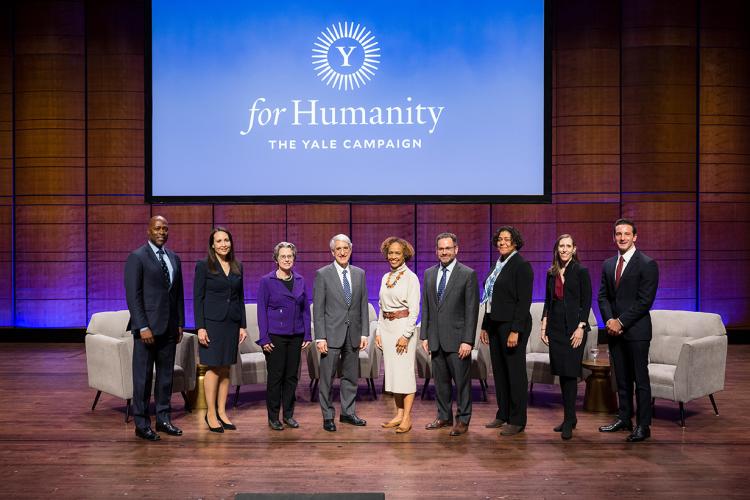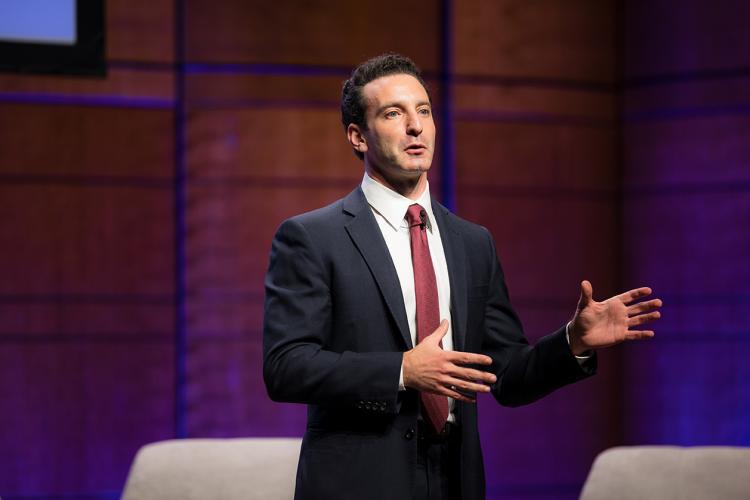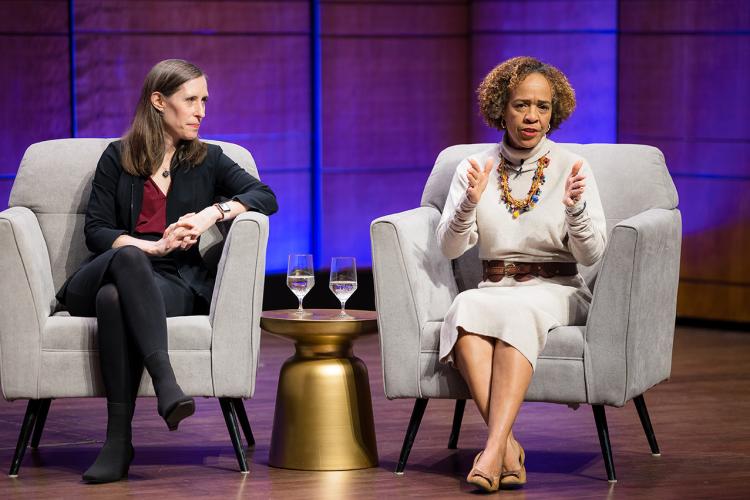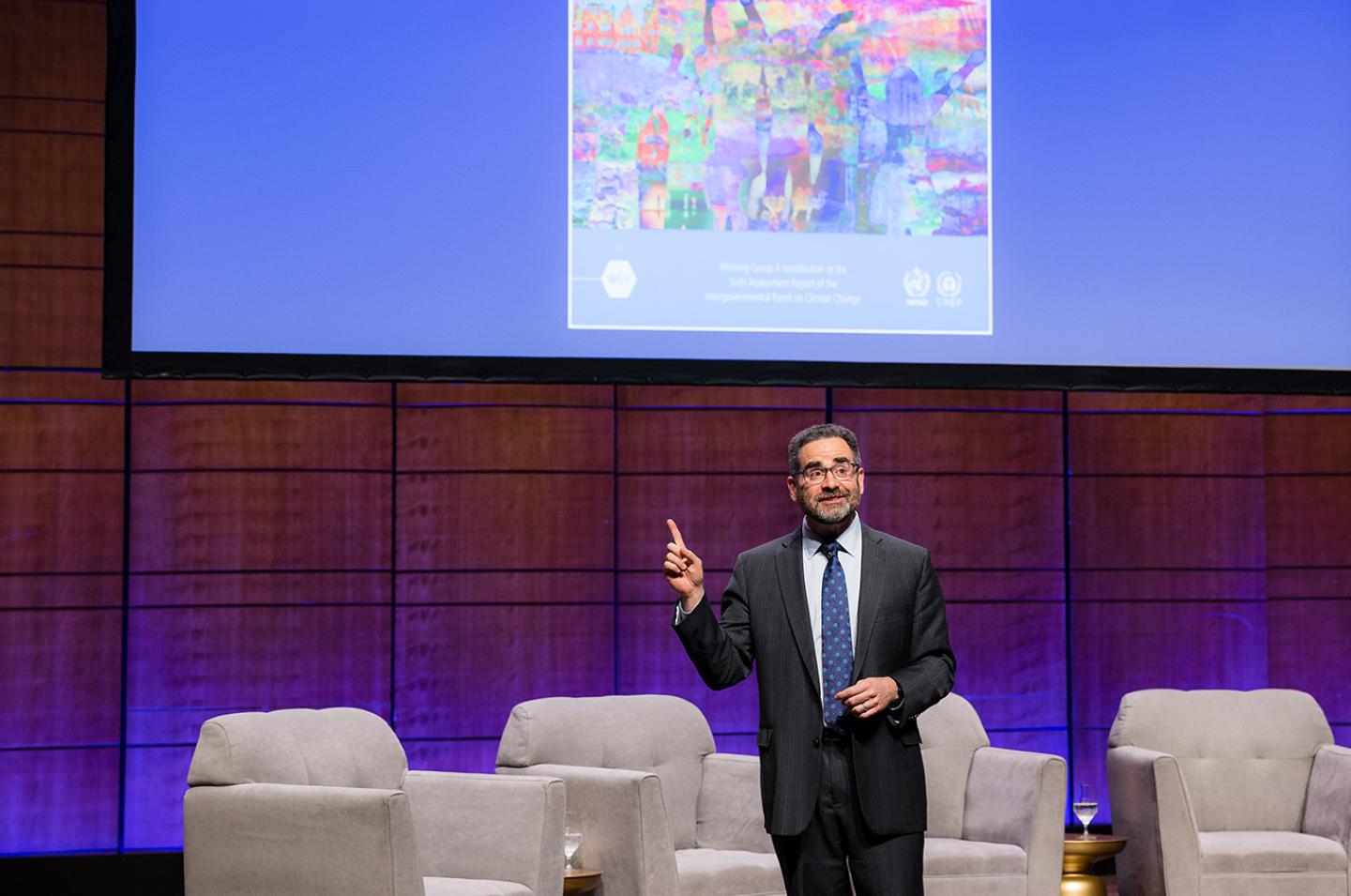Across Yale, scholars generate vital, innovative research that breaks new ground in every area of academic inquiry. But how does that scholarship translate into real-world impact?
On October 24, nearly 400 members of the Yale community gathered at the John F. Kennedy Center for the Performing Arts in Washington, DC, for the latest installment in the For Humanity Illuminated event series. The evening featured five Yale experts who shared how their work has informed evidence-based solutions in climate, health care, international law, and other critical policy arenas. They also spoke to how Yale is preparing students to become tomorrow’s leaders.

Fostering Climate Changemakers
Robert Klee ’99 MES, ’04 JD, ’05 PhD is a lecturer at Yale School of the Environment and managing director of clean energy programming at Yale Center for Business and the Environment. In his remarks, he explained Yale’s mentorship of a new generation of climate leaders.
“In terms of climate, this has been an extreme year among extreme years,” Klee said. “The choices that we make in this next decade will be critical for the long-term habitability of our planet. In order to address this existential crisis, this challenge, we need leaders who utilize and appreciate the value of rigorous, evidence-based research, leaders with a deep understanding of science, policy, equity, and justice.”
Klee works with Yale College students in a summer fellowship program called Planetary Solutions in Clean Energy, offering research and internship opportunities to students committed to advancing energy equity and pursuing a career in the clean energy field.
He shared the story of one of those students, Grace Thybulle BR ’25. Her work focuses on the intersections of racial equity and environmental justice, and she aims to develop climate solutions benefitting historically marginalized communities. Her work has brought her to Puerto Rico, where she has helped develop a community-based solar microgrid to provide clean, reliable power in the small town of Adjuntas.
“Creating leaders is a critical way that Yale can help address complex global issues like climate change,” Klee said. “I view my job, and it is a privilege to have it, as equipping students and practitioners with the foundations of good science and research and all of the perspectives of practical experience, so they can go off and be leaders who affect change.”
Ending Surprise Medical Billing
Zack Cooper is an associate professor of public health and associate professor of economics at Yale. He also serves as director of health policy at Yale’s Institution for Social and Policy Studies. In his talk, he shared how his research directly shaped federal policy to end surprise medical billing.
Cooper explained the genesis of his work: he read a story about a man who went to an in-network hospital in an emergency, was treated by an out-of-network doctor, and received a bill for nearly $1,000—a “surprise medical bill.”

Cooper wondered how common this issue was and, through his research, discovered that about one in five patients who went to an in-network hospital in an emergency were treated by an out-of-network physician, and they faced an average surprise bill of $1,000.
After his work was publicized in the New York Times, Cooper traveled to Washington fifteen times in two years, presenting at the White House, meeting with Hill staffers, and speaking to leaders in Congress. Just a few years later, the “No Surprises Act” was signed into law.
“We have an obligation to look at kitchen table issues, the issues that American families are facing every day, so we make it clear that the work we do isn’t just for the benefit of the folks on our campus,” Cooper said. “Why we’re here is the betterment of the world around us.”
Shaping International Policy
Bisa Williams ’76 is the former US Ambassador to Niger and a senior fellow at the Yale Jackson School of Global Affairs. In her talk, she spoke about her work on conflict in the Sahel region of Africa. She described a graduate course at the Jackson School that included a two-week trip to Mauritania and Senegal, where Williams and her students evaluated the role of sustainable agriculture in industrial farming.
“This is exactly the power of the Yale experience, the power of Yale’s influence, its global reach and relevancy, and it is a tribute to Jackson’s determination to train the world leaders of tomorrow who will continue to tackle these pressing challenges for the benefit of all humanity,” Williams said.

Oona Hathaway ’97 JD, the Gerard C. and Bernice Latrobe Smith Professor of International Law at Yale Law School, described how her students are working to craft a legal justification to freeze Russian assets to serve as reparations to Ukraine.
“Yale and other institutions of higher education are uniquely well positioned to be relevant in conversations about the many global challenges the world faces,” Hathaway said. “As academics, we can work to understand the problems that matter to those who are trying to make policy and provide valuable, actionable, non-partisan research that is motivated by a genuine desire to help understand the problem and map a course toward the best solution. And through our teaching, we can create a generation of new leaders with the full range of skills they will need to tackle the many challenges they will face.”
Leading Communities
Heidi Brooks, senior lecturer in organizational behavior at Yale School of Management (SOM), teaches and advises on everyday leadership: the day-to-day micro-moments of impact that shape our lived experiences. In her talk, she discussed how she works with students to develop leadership skills in concert with organizational culture.
“Many people think of leadership as an individual endeavor, but I think we’re fooling ourselves,” Brooks said. “Leadership is fundamentally a group activity.”
Brooks referred to The Broad Center at Yale SOM, which develops leaders for public school systems and shapes the policy debate relating to K–12 education.
“When I think about organizations, I see them as communities,” Brooks said. “Therefore, leadership in an organization is leadership of a community. All of what we do happens in context, so my work taps into the interplay across individual, interpersonal and group dynamics—the ecology of a community.”
Educating Leaders
Following their presentations, the five speakers joined a panel discussion on the application of academic work to policy moderated by For Humanity Campaign Co-Chair Donna Dubinsky ’77. President Peter Salovey ’86 PhD closed the program with reflections on how Yale fosters leadership.
“We teach that leadership is not a grand moment,” Salovey said. “We teach that although leadership can be demonstrated at a moment’s notice, it can’t be developed in one. So on campus, our students are developing deliberately, systematically, daily into leaders who can thrive and change the world.”
Next: Boston
For Humanity Illuminated travels to Boston on November 9, and Palm Beach, FL and Dallas/Fort Worth, TX next spring. Visit the For Humanity Illuminated page to stay up to date on upcoming events and watch recordings of past programs.
